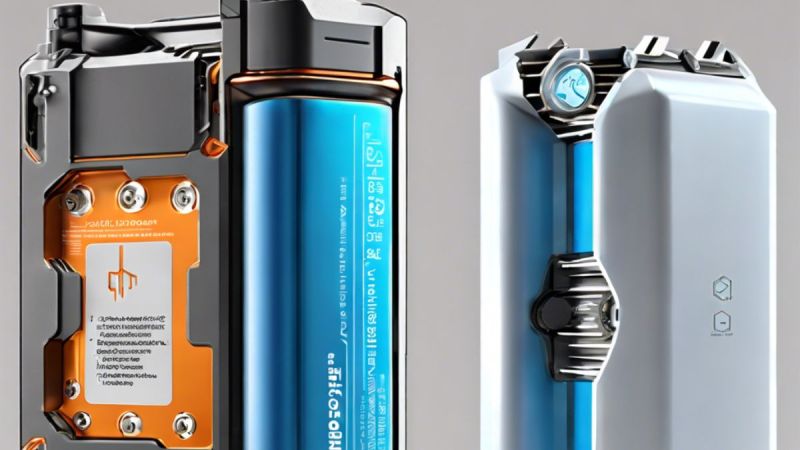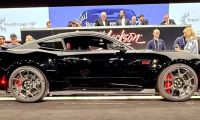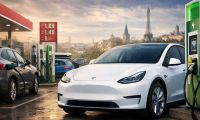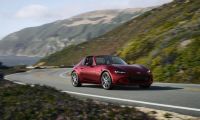While Lithium-ion batteries provide decent performance in electric cars, solid-state batteries promise greater range, faster charging, and enhanced safety. So, who will win the race to power the future of electric mobility? Buckle up, as we explore the strengths and weaknesses of both contenders.
Lithium-Ion Batteries: The Familiar Champion, Still Evolving
Pros:
- Proven and Present: These batteries are established workhorses, backed by mature supply chains and infrastructure.
- Wallet-Friendly: Compared to their futuristic challenger, lithium-ion options are currently more affordable.
- Decent Range for Daily Life: While not groundbreaking, they offer enough range for most everyday commutes and errands.
- Constant Improvement: Research and development continue to push the boundaries of performance and cost. Here's where things get interesting:
Lucid Motors, a luxury EV manufacturer, showcases how far lithium-ion can be optimized. Their achievements boast:
- Lightning-Fast Charging: Their proprietary charging architecture enables the Lucid Air to gain 200 miles of range in just 20 minutes.
- Noteworthy Efficiency: The Lucid Air Dream Edition Range showcases impressive efficiency through its innovative design and drivetrain, achieving an EPA-estimated range of 520 miles. This underscores the extended range potential of lithium-ion technology, as Lucid leverages its power at approximately 4.7 miles per kilowatt-hour (kWh).
- Compact Pack, Big Range: The Lucid Air Pure, with its 88 kWh battery, manages an impressive 406 miles of range, demonstrating efficient battery packaging technology.
These advancements reveal that even established technologies like lithium-ion can surprise with significant improvements in range, charging speed, and efficiency.
Cons:
- Range Limitations: Compared to solid-state, lithium-ion batteries pack less energy per unit volume, translating to a shorter range in most cases.
- Thermal Runaway Risk: The flammable liquid electrolyte poses a fire hazard if damaged or overheated.
- Degradation Over Time: Like all batteries, they lose capacity over time, requiring more frequent replacements.
- Charging Speed: While improving, they generally don't offer the rapid charging potential of solid-state batteries.
Solid-State Batteries: The Promising Challenger, Still on the Starting Line
Pros:
- Revolutionary Range: These batteries hold the potential to double or even triple the range of EVs, drastically reducing range anxiety.
- Safety First: The non-flammable solid electrolyte eliminates the risk of thermal runaway, making them inherently safer.
- Longevity: With less degradation, solid-state batteries could require fewer replacements throughout an EV's lifetime.
- Speedy Refueling: Imagine charging your EV in just 10-15 minutes. Solid-state could make that a reality.
The QuantumScape-VW Partnership: Accelerating Development
QuantumScape, a pioneer in solid-state technology, has joined forces with Volkswagen, a global automotive giant. This powerful alliance is:
- Building a 1-GWh Pilot Line: Scheduled to start production in 2024, this facility will scale up production and test real-world performance.
- Testing Larger Cells: 10-layer cell testing demonstrates progress towards practical battery formats used in actual EVs.
- Enduring Results: Volkswagen's PowerCo confirmed passing an endurance test with a QuantumScape cell, showcasing exceptional performance and cycle life.
These combined efforts represent a significant step forward in the solid-state battery race.
Cons:
- Early Stages: Still in development, solid-state batteries are not yet commercially available on a large scale.
- Costly Affair: Complex manufacturing processes translate to higher battery costs compared to lithium-ion.
- Data Needed: Widespread use is crucial for gathering more performance and reliability data.
- Recycling Challenge: Efficient recycling methods for solid-state batteries are still under development.
Navigating the Future: Collaboration or Collision?
A complete switch from lithium-ion to solid-state is unlikely in the immediate future. Cost, manufacturing hurdles, and infrastructure development present significant challenges. So, what does the future hold?
Possible Scenarios:
- Hybrid Approach: Combining both technologies could leverage their strengths. Solid-state batteries could provide core range, while lithium-ion offers additional, lower-cost capacity.
- Gradual Transition: Niche markets like high-performance EVs and long-range trucks might adopt solid-state first, paving the way for broader adoption as costs decrease.
Continued Advancements: Research and development are crucial to overcoming challenges like manufacturing complexity and developing efficient recycling methods.
Nio “Semi-Solid State” technology?
Don't Get Hyped Too Soon: A Closer Look at Nio's "Solid-State" Battery Claims
While recent headlines might lead you to believe Nio has achieved a revolutionary breakthrough in EV batteries, taking a closer look reveals a more nuanced picture. Here's what you need to know:
The "Solid-State" Misnomer: The battery used in Nio's prototype isn't a true solid-state battery, but rather a semi-solid-state version. This technology still uses a liquid electrolyte, albeit with a thicker, gel-like consistency. True solid-state batteries eliminate liquid entirely, offering potential safety and performance advantages that Nio's current technology doesn't possess.
Limited Real-World Performance: The impressive 1,044 km (650 miles) range was achieved under ideal conditions: cool temperatures and speeds below 50 mph. This doesn't represent typical driving scenarios, where factors like highway speeds, weather changes, and climate control significantly impact range. In real-world conditions, the actual range would likely be much lower.
Efficiency is Key, Not Just Size: While the 150 kWh battery pack boasts a large capacity, its energy density falls short. At the single cell level, it manages 360 Wh/kg, but at the pack level, this drops to 260 Wh/kg. This is lower than other leading EV batteries, such as those used in Tesla vehicles, which can reach over 300 Wh/kg at the pack level. While Nio seems to achieve 4.33 miles/kwh, about the efficiency of a Tesla Model 3, Lucid has achieved 4.7 miles/kwh. This means, that despite its size, the Nio battery doesn't necessarily translate to superior efficiency.
Not Ready for Prime Time: It's crucial to remember that this is still a prototype. Mass production and real-world implementation are significant hurdles to overcome before this technology can be widely adopted.
The Bigger Picture: While Nio's achievements are noteworthy, it's important to maintain realistic expectations. Their "solid-state" battery is not quite there yet, and several challenges remain before it can truly revolutionize the EV landscape. Focus on actual results and proven technologies when evaluating advancements in this rapidly evolving field.
I hope this provides a more balanced perspective on Nio's battery technology and its current limitations. Don't let hype cloud your judgment; wait for real-world data and mass production before declaring it a game-changer.
The race between solid-state and lithium-ion batteries is not a competition for sole dominance, but rather a collaborative journey towards a more sustainable and electrified future. While solid-state holds immense potential, the journey will be paved with innovation, cost reductions, and infrastructure development.
Additional Resources:
- Solid-state battery research: https://www.ssbats.com/
- Lithium-ion battery recycling.
- QuantumScape website: https://www.quantumscape.com/: https://www.quantumscape.com/
- Volkswagen Group website: https://www.volkswagen-group.com/en/: https://www.volkswagen-group.com/en/
- QuantumScape & VW joint venture press release: <invalid URL removed>: <invalid URL removed>
- PowerCo press release on QuantumScape cell testing: https://www.volkswagen-group.com/en/press-releases/powerco-confirms-results-quantumscapes-solid-state-cell-passes-first-endurance-test-18031: https://www.volkswagen-group.com/en/press-releases/powerco-confirms-results-quantumscapes-solid-state-cell-passes-first-endurance-test-18031
Loc Trang is an automotive expert and currently a bullish fan of Lucid Motors. He is the administrator of Lucid Motors Investors and Lucid Owners Club groups among others on Facebook and covers news and opinion on Lucid Motors. You can follow him on X at Logan-T for more.













Comments
Considering solid state…
Permalink
Considering solid state including ASSB are Lithuim-ion this entire article is just useless fluff.
Nice article. But in the U.S…
Permalink
Nice article. But in the U.S. the most common batteries are NCA/NCM/LFP batteries. Solid state batteries are still mostly in the research phase. And even if solid state batteries can be scaled to volume production, and are comparably priced, it will likely be several years away from now. Plus there are other upcoming battery technologies that will be better in specific ways. 2nd gen sodium ion batteries promise 200+ Wh/kg at a far lower cost than even LFP batteries. They will be well suited for stationary storage, and small/efficient EVs. Sulfur lithium batteries have similar energy density to the best solid state batteries at a far lower cost. And other chemistries like aquious zinc look promising as well. The best news is that R&D on new batteries is moving forward steadily, so supporting EVs with their current technologies is good now, and they also promise improvements for the next generation as well.